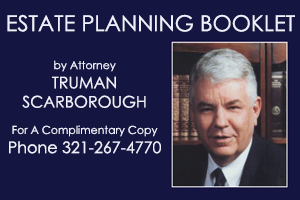Can adding children’s names to property create problems?
By Attorney Truman Scarborough
In the last article, we looked at issues that should be considered before making out right gifts to children. Problems can also be encountered when children are made co-owners of property with the parent. In this article, we will consider some of these issues.
Parents add children’s names to accounts for various reasons. It may be so the child can access the account to pay the parent’s bills. Frequently, parents add their children’s names on accounts or deeds to avoid probate. The reason is when someone dies with assets titled just in his/her name without beneficiaries the asset is frozen. Probate is required to access the assets. A Power of Attorney does not work, since it is effective only while the creator is living. It is similar to an employer – employee relationship. If an employer goes out of business there are no employees.
In probate, a Personal Representative (executor) is appointed by the Court to administer the estate. Throughout the process of collecting assets, paying bills and finally making distribution to the beneficiaries, the Personal Representative must show the Probate Court that everything is proceeding in accordance with Florida Statutes and Probate Rules. The word probate essentially means “to prove.” When everything runs smoothly, formal probate takes around six months from the time the petition is filed with the court. There are fees and court costs. For an estate between $100,000 and $1,000,000, Florida Statutes suggest the reasonable fee for both the Personal Representative and the attorney would be 3% of the gross assets.
This leads people to ask: “Can probate be avoided by adding children’s names to property?” Yes, jointly owned property with survivorship rights goes to the survivor. Unfortunately, this simple solution can create other problems: First, with joint bank accounts, the child has the ability to use the funds as he desires. Second, with real estate there is a loss of control. Any further transfer will require the child’s signature on the deed. For example, if a widow adds one child to the title of her home but later wants it to go equally to her several children, it would require the child deeding his/her rights in the property back to the mother. Third, jointly owned property is exposed to the child’s creditors. Fourth, only one-half of the property will receive a “stepped-up basis.” In determining the capital gain tax on appreciated property, the basis (normally the purchase price) is subtracted from the sales price. When property is inherited at death, the date of death value becomes the basis reducing the capital gains tax when the property is sold. Fifth, when a gift exceeds the annual exclusion of $17,000 (as of 2023), a 709 Gift Tax Return should be filed with the IRS. Sixth, a home is not counted as an asset by Medicaid, but adding a child’s name on the title is a gift which may prevent obtaining Medicaid. Seventh, with the home, the parent may lose some of his/her homestead property tax exemption. Eighth, if the child dies first, the property must be probated.
With some accounts you can name a beneficiary to receive the account when you die to avoid probate. Another way to avoid probate is the Revocable Living Trust. It offers greater planning flexibility and provides for incapacity.
For further information on estate planning you may be interested in Attorney Truman Scarborough’s Booklet on Estate Planning in Florida. It is available without charge or obligation by calling (321) 267 – 4770. His office is located at 239 Harrison Street, Titusville, Florida.


Recent Comments